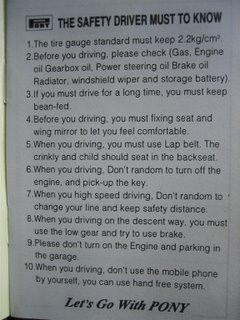Language = Understanding?
Many times I came across the idea to learn Mandarin, infact it's an idea still well into my plans, just temporary delayed due to different priorities. However, I hope Shihyun will be willing to teach me a bit more than I already know. I would really like to have some lessons from her, mah!
I have bought myself plenty books and CDs to get up to speed with Mandarin, but I will need to follow a full immersion course for a sustained period of time, sooner or later. I really think that would be the best way to get more and more involved, to be a better 外國人. I will get there, eventually, and I will need some help from Chinglish, once it gets up and running.
But I have always wondered: does speaking the language mean understanding the people? I could get what they say, but could I get what they mean?
Sure, my numerous trips to Asia prove beneficial for this, hanging around with Shihyun and her friends surely helps, gives me an inside view of locals, get to know their customs and lifestyle. And makes it easier to pick up new words too.
I was fortunate enough to have the chance to be in Asia more times than I could honestly dream of. But if you think everywhere is the same, think again. In Singapore and Malaysia, you need to make your talking sweet and dandy to get to SINGLISH. It's just so funny the way they speak there. Ya lor, no joke. Can you understand it? Of cos caaaaaaaaaan. Ke yi, ke yi!
Ok ok lah, it's surely different from Japan. There, it's a mess, although an "enjoyable" one, still a mess. More times than not, Rs and Ls are swapped and misplaced, making it very hard to understand a Japanese trying to speak English, or EngRish! I just woder, L and R on a pair of gloves would mean Left and Right, or Light and Reft?? Maybe it's just me, simpRy because I'm a foLeigneL, and I don't speak the Ranguage. Anyway, messy is the keyword in Japan. Surely, you would feel too Lost in Translation!
India? I bet anyone to understand an Indian speaking English at full speed. The accent is so thick, and at the same time, they believe it's not. Last December I was looking at them with big eyes full of question marks, and they looked back at me like... hey, wake up, I'm talking to you! yeah, I know you are talking to me, I HEAR you, I definitely hear you... I just don't have a clue what you are talking about!
Finally, China and Taiwan. Similar, if you ask president Hu they are the same country, so they must be the same. Truth is, they are, at least as far as English is concerned. Sorry president Chen, sorry CKS. You would think that Taiwan, the most Americanized country outside North America, would sport an overall acceptable English knowledge, but... no! At least that makes up for some funny signs I have found here and there.

Anyway, bottom line, anywhere you are in Asia, probability is you will find yourself in interesting situations. And eventually, you will end up speaking like them, as it is very involving.
And, as my friend Samuel L. Jackson says... do they speak English in whaaaat??


I have bought myself plenty books and CDs to get up to speed with Mandarin, but I will need to follow a full immersion course for a sustained period of time, sooner or later. I really think that would be the best way to get more and more involved, to be a better 外國人. I will get there, eventually, and I will need some help from Chinglish, once it gets up and running.
But I have always wondered: does speaking the language mean understanding the people? I could get what they say, but could I get what they mean?
Sure, my numerous trips to Asia prove beneficial for this, hanging around with Shihyun and her friends surely helps, gives me an inside view of locals, get to know their customs and lifestyle. And makes it easier to pick up new words too.
I was fortunate enough to have the chance to be in Asia more times than I could honestly dream of. But if you think everywhere is the same, think again. In Singapore and Malaysia, you need to make your talking sweet and dandy to get to SINGLISH. It's just so funny the way they speak there. Ya lor, no joke. Can you understand it? Of cos caaaaaaaaaan. Ke yi, ke yi!
Ok ok lah, it's surely different from Japan. There, it's a mess, although an "enjoyable" one, still a mess. More times than not, Rs and Ls are swapped and misplaced, making it very hard to understand a Japanese trying to speak English, or EngRish! I just woder, L and R on a pair of gloves would mean Left and Right, or Light and Reft?? Maybe it's just me, simpRy because I'm a foLeigneL, and I don't speak the Ranguage. Anyway, messy is the keyword in Japan. Surely, you would feel too Lost in Translation!
India? I bet anyone to understand an Indian speaking English at full speed. The accent is so thick, and at the same time, they believe it's not. Last December I was looking at them with big eyes full of question marks, and they looked back at me like... hey, wake up, I'm talking to you! yeah, I know you are talking to me, I HEAR you, I definitely hear you... I just don't have a clue what you are talking about!
Finally, China and Taiwan. Similar, if you ask president Hu they are the same country, so they must be the same. Truth is, they are, at least as far as English is concerned. Sorry president Chen, sorry CKS. You would think that Taiwan, the most Americanized country outside North America, would sport an overall acceptable English knowledge, but... no! At least that makes up for some funny signs I have found here and there.

Anyway, bottom line, anywhere you are in Asia, probability is you will find yourself in interesting situations. And eventually, you will end up speaking like them, as it is very involving.
And, as my friend Samuel L. Jackson says... do they speak English in whaaaat??





0 Comments:
Post a Comment
<< Home